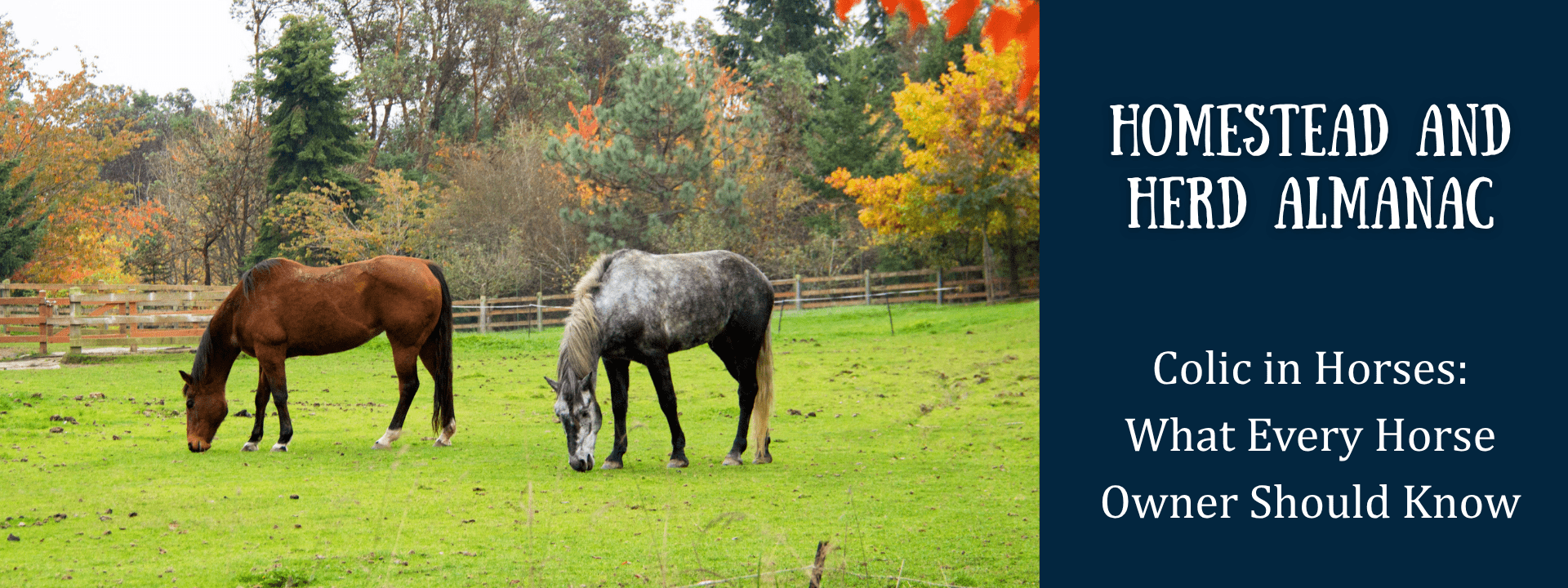
Colic in Horses
Colic remains one of the most common and feared emergencies in the horse world. It simply refers to abdominal pain, but the causes, severity, and outcomes can vary greatly. Colic is the leading cause of death in horses ages 1–20, and the second most common cause in senior horses. While not all cases are preventable, over 80% can be successfully managed with prompt at-home veterinary-supported care.
The key is early recognition, calm handling, and understanding when to call your veterinarian.
Common Signs of Colic
Every colic case is different, and signs may range from mild to severe. Watch for:
- Looking at or biting the flank
- Kicking at the belly
- Lying down, stretching out, or rolling
- Reduced manure output, small fecal balls, or dry/mucous-covered manure
- Changes in eating or drinking habits
- Depression or restlessness
- Tacky gums, pale or discolored mucous membranes, or delayed capillary refill time
- Elevated heart rate (over 45–50 BPM)
Severity of behavior does not always reflect severity of the problem – even a mild-looking colic can be serious internally.
Myths and Facts
|
Common Belief |
Reality |
|
Rolling causes twisted guts |
False. Rolling does not cause twists. |
|
A colicking horse should not lie down |
False. Lying quietly is fine. |
|
Horses must be walked constantly |
False. Walking can help, but do not exhaust the horse. |
Walking can promote motility, but stop if the horse is painful or unwilling. Quiet lying is acceptable as long as the horse is not thrashing.
Major Types of Colic
- Impaction
Colic: Feed or sand blocks part of the intestine; often linked to dehydration, coarse feed, or poor motility. - Gas Colic: Excessive fermentation causes gas buildup and discomfort; often mild and responds well to treatment.
- Displacement or Twist: The large colon can shift or twist, cutting off blood supply. This is an emergency requiring immediate surgery.
- Motility Disorders: When the gut stops moving, fluid and gas back up, increasing risk of rupture and toxicity.
When to Call the Veterinarian
Contact your vet if:
- Signs are moderate to severe
- Vital signs are abnormal
- There is no improvement with walking
- You do not know how long signs have been present
Be ready to share:
- Vital signs (heart rate, respiratory rate, gum color, temperature)
- Manure output
- Feed changes
- Deworming and dental history
- Recent stressors, foaling, or travel
Treatment Options
Depending on findings, your veterinarian may use:
- Pain control and sedatives
- Nasogastric tubing to relieve pressure or give fluids/laxatives
- IV fluids for dehydration
- Enemas (foals)
- Surgery (less than 10% of cases require it)
Senior horses recover from surgery as well as younger horses, and modern anesthesia and surgical advancements have significantly improved survival rates.
Reducing Colic Risk
While some colics are unpreventable, good management lowers risk:
Always provide clean, fresh water
Horses without water are dramatically more likely to colic – especially those over age 6. In winter, warm water increases intake.
Maximize turnout
Pasture reduces colic risk. Horses on round bales or confined to stalls experience more cases.
Avoid feeding hay on sandy ground
Use mats, feeders, or tubs to reduce sand ingestion.
Use grain only when necessary
Each pound of added whole grain significantly raises colic risk. High-sweet or high-pellet diets also increase incidence. For gut health, forage should be the foundation.
Make all changes slowly
Feed, exercise, or housing changes can triple colic risk within two weeks if done abruptly.
Routine dental care and deworming
Float teeth every 6 months and maintain parasite control – both are key to proper digestion.
Observe your horses personally
Research shows horses are 2–3 times less likely to colic when closely monitored by their owner.
Final Thoughts
Colic will always be a possibility in horses, but informed management, early intervention, and good feeding practices make a tremendous difference. At Kaniksu Feeds, we believe healthy digestion starts with high-quality forage, balanced nutrition, and attentive daily care
